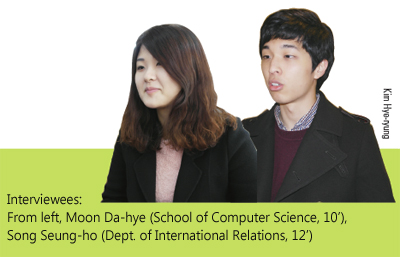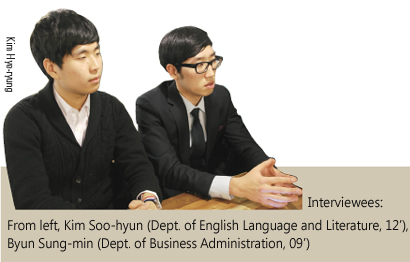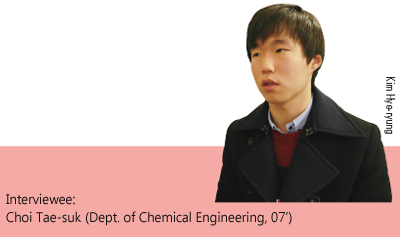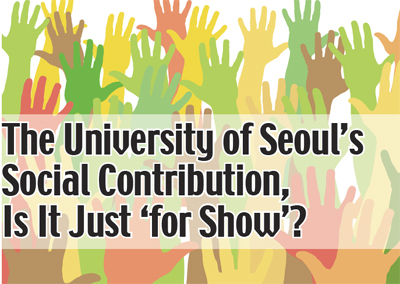Since Seoul mayor Park Won-soon made his promise to cut tuition fees in half for the University of Seoul (UOS), many UOS students replied by promising to contribute more, socially, to the local communities. Since then, it has become common to find articles stating that UOS students’ volunteerism has almost doubled. Even considering the fact that one of the UOS’ primary visions is ‘social contribution,’ ever since the UOS faced a lot of opposition to cut tuition fees in half, the UOS and Park have strived to further boost contributions to meet public expectations.
This was directly shown through the video played at the Volunteerism basic training class. In this video, Park said, “Since I made the Half Tuition Fees Policy possible for you all, you should participate in many volunteering programs, right?” Although Park’s intention might not be to pressure students, this clearly gave the impression that UOS students need to feel a strong responsibility for social contributions in order to derive more participation in school-based volunteering programs from fellow students.

Then, let us seek out the truth; are the UOS’ current volunteering and social contributions really just ‘for show’ in order to meet public expectations? The UOS Times looked for a possible solution to solve this dilemma.
As aforementioned, the UOS’ social contributions dramatically increased after the Half Tuition Fees Policy came into effect. Last year, the UOS created a ‘Social Contribution’ department, which specializes in planning and promoting school-based volunteer programs on campus. Among the various volunteer programs, ‘Donghaeng Project’ is one-on-one mentoring service for elementary to high school students in Seoul. Other programs such as ‘Free Offline Computer Classes for Local Senior Citizens,’ ‘Umji Newspaper’ and ‘Saessak Mentoring’ are all newly organized UOS volunteer programs.
It is surely a positive outcome of the UOS’ attempt to increase its volunteer programs and social contribution. Nevertheless, a sharp increase in the number of volunteer programs and participant students after the Half Tuition Fees Policy is likely to be seen, as if the students have been pushed to join the programs. Thus, The UOS Times covered whether the UOS purposefully emphasized the necessity of UOS students to participate in these programs. We also covered how UOS students actually feel about this through interviews with both participant and non-participant students of the volunteer programs.

Q. When you were giving a presentation on your volunteering experience at the ‘UOS’ Social Contribution Presentation,’ did you feel the need to relate your motivation to participate in the volunteer program with the Half Tuition Fees?
Moon: No, I never felt such need. Even the reason why I attended the ‘UOS’ Social Contribution Presentation’ was because I wanted to do willingly, not because I felt obligated to. Also, I was not aware, until I heard other teams’ presentations, that there were students who tried to contribute more because of the benefits we received from the Half Tuition Fees Policy.
Song: I did not deliver a presentation. I only listened to other teams’ presentations. But every single team related their volunteering with the need to return the benefits of the Half Tuition Fees Policy to society. The Half Tuition Fees Policy should not be the primary motivation for volunteering, but the reality is that it is hard for us to ignore it. The Half Tuition Fees Policy itself may have influenced the students’ volunteering, but I think one’s sense of responsibility to return its benefits to the society is quite different from this. The responsibility alone cannot be the motivation for volunteering.
Q. Do you think your own motivation for volunteering was somewhat affected by your sense of responsibility to return the benefits of the Half Tuition Fees Policy to society?
Moon: Not at all. While abroad, I used to help out young children through an overseas volunteering program with other students. Then when I came back to Korea, I saw a promotion from Seoul Volunteer Center by chance, so I asked the members from the overseas volunteers program to join me for a new volunteer program. We simply wanted to carry out volunteering as we did overseas, so we created a new volunteering team ‘Na-nu-eo Dream’ to help children from multicultural families.
Song: The main reason why I participated in the Donghaeng Project was because of my own personal reasons. Although I personally do not think UOS students are being given enormous privileges, it is true that we do have exclusive privileges. However, students do not need to feel obligated to return these privileges to society, but rather they should have a sense of responsibility.
Q. Have you ever felt or experienced the UOS’ attempt to push its students to feel the necessity to return the benefits of the Half Tuition Fees Policy to society (like noblesse oblige) when you were participating in UOS volunteer programs?
Moon: No, I did not feel that our university was pushing me too much. In fact, I thought the school’s attempt worked in a rather positive way for encouraging and helping students to volunteer more, not as ‘pressure’ on the students. In fact, our volunteering team got a lot of help when we were mapping out our volunteer program. Also, I am not entirely sure, but I have heard about another team named ‘SIFE’ which also got some help from the school as well.
Song: The UOS cannot ignore its social contribution for the local community. In the case of the Donghaeng Project, when looking at the number of participant students from each university, the UOS did not have the highest number. I do not think the UOS is directly pressuring the students to volunteer, but it might be true that it is actively encouraging students’ participation. In fact, most of UOS volunteer programs, including the Donghaeng Project, had a soaring increase in participant students.
Q. What do you think about the UOS’ attempt to more active social contribution, especially after the Half Tuition Fees Policy came into action? (i.e., giving additional points to participant students of the Donghaeng Project who apply for oversea volunteer programs)
Moon: I think it is good. I think our university provides more chances to have occasions such as the ‘UOS Social Contribution Presentation.’ There must be a lot of other students who make volunteer teams themselves and participate in various kinds of volunteer works. If we had more such occasions, it would encourage more students to become interested in volunteering. Moreover, in the Donghaeng Project’s case, not only the UOS, but other universities also provided benefits to the participant students. So why should we consider this in a negative way?
Song: I do not see any reason to think it is bad. One of the UOS’ primary visions is social contribution. It is reasonable.

Q. Are you currently participating in any voluntary services outside the UOS?
Kim: I have been participating in a voluntary service operated by the Guro District Office, teaching children from low income families for the past year. I also work at the collaborative ‘University Students’ Donation for Education,’ in which I give presentations on educational know-hows.
Byun: I did not have any opportunities to take part in any volunteer programs outside the school since I left the university temporarily.
Q. Did you know about any of the UOS’ volunteer programs? If you did, why did not you take part in these?
Kim: I knew there were some volunteer programs administered by our university, but I thought doing voluntary services outside the university was much better. The donation for education collaborative that I am running as a representative is in cooperation with the Guro District Office to teach math for free to students from low income or multicultural families. These students cannot receive proper education at times. Our collaborative focuses on a one-on-one education system and educates the students at least 20 hours a week. In addition, we have teachers who went through proper and systematic education to teach the students. Thus, we provide higher quality service than our university’s.
Byun: I simply did not think that the UOS’ volunteer programs had more merits than the programs outside the school. Moreover, the former programs administered by our university just did not sound interesting to me.
Q. Are there any specific reasons that you would consider UOS volunteer programs negatively?
Kim: Those programs are mostly promoted only for a short-term. However, volunteer programs should go on for a long period and be systematic. School-based volunteer programs, thus, would be just shown as for show, if they are only promoted for one semester.
Byun: I personally thought that I would not enjoy participating in UOS volunteer programs. Added to that, I was repulsed by these programs because it felt like the school was pressuring the students to take part in them after the Half Tuition Fee Policy was implemented.
Q. In what way do you want UOS contributive activities or its volunteer programs to change?
Kim: First, there is a need to select the specific targets of who are to receive the voluntary services and provide an ideal condition for the donation for education. Also, the volunteer programs should be promoted for at least six months to a year. Finally, since the compensation system for volunteering, such as the ‘Seoul Mayor Prize,’ might seem as an improper inducement to those people who just want to take part in the volunteer activities for personal benefits, I think it should be removed.
Through the two interviews, what we found interesting was that the participant students decided to join these programs not because they felt the responsibility to return the benefits from the Half Tuition Fees to the society, but because they simply wanted to volunteer. They also said that they did not feel any pressure from the university to take part in the volunteer programs. It is the title ‘Half Tuition Fees Policy,’ which always naturally comes along with the name of the university that makes UOS voluntary services to be perceived as ‘for show.’ On the other hand, the non-participant students said that it is somewhat reasonable that UOS volunteer programs are perceived as ‘for show,’ because realistically speaking, the programs are promoted only for a short-term and are very non-systematic.
Finally, we interviewed the leader of YESUOS, a volunteering club at the UOS, which has been doing various volunteer activities regardless of the Half Tuition Fees Policy, in order to hear what he thinks of UOS volunteerism system.

(A volunteering club at the UOS)
Q. YESUOS was established even before the Half Tuition Fees Policy was discussed. But ever since this policy took effect, has YESUOS been actively cooperating with the school to promote volunteer programs?
Choi: YESUOS’ volunteering activities are all planned and promoted by the Student Council. So the council it
elf is well-connected with the school, but we are not. We cannot do anything more than just let students know which volunteer programs are being promoted at the moment.
Q. What do you think about the volunteer programs administered by our school?
Choi: I do not know the school’s policy, but I personally think the school’s primary goal is to have as many participant students as possible. However, when it comes to volunteering, I think the most important value is ‘continuity’ and these programs lack continuity. The same participant should continue to show up and participate in volunteer activities. For the problems with UOS volunteer programs due to their discontinuity and short duration, volunteering clubs are the best solution. I saw many students joining our club for reasons like ‘There are lots of girls in this kind of club’ or ‘Volunteering can become one of my Specs (abbreviation of specification)’ and so on. However, these people change over time, after they continually participate in volunteer activities. Thus, the genuine volunteering sprit develops over time.
Q. Are there any changes you wish would be made in UOS volunteerism system?
Choi: YESUOS never received special budget considerations for being a ‘volunteering’ club. Most of the money given to the central clubs at our school first goes to performing clubs and others receive the leftovers. Therefore, we never really have a chance to voluntarily promote programs by ourselves due to a lack of budget. If the UOS separates volunteer clubs from other clubs to make them into official subcommittees and provide them with bigger budgets and more support, the problems with UOS volunteerism system would be resolved.

Ever since the Half Tuition Fees Policy took effect at the UOS, UOS social contributions have dramatically increased, which should be considered one of the positive effects of the Half Tuition Fees Policy. However, it would not be right to contribute to society just because of the obligation to return the benefits of Half Tuition Fees to society in order to exclusively meet public expectations. Therefore, rather than focusing on increasing the overall number of contributive activities and participant students through short-term and sporadic volunteerism, the university should enhance the quality of its volunteer programs.
In addition, the city of Seoul and the UOS should focus more on helping students realize the genuine meaning of volunteering, rather than emphasizing the need for students to have a sense of responsibility or obligation. They should encourage students to participate in volunteer activities by stressing the opportunity to find one’s disposition or ideal career through these activities. In this way, students would be able to take part in UOS volunteer programs that are not quantitative but rather qualitative. With such volunteer programs, UOS contributive activities and voluntary services would not be regarded as ‘for show’ any longer.
Kim Hye-ryung Reporter
parisienne314@uos.ac.kr
Kim You-jin Reporter
cleo9207@uos.ac.kr

